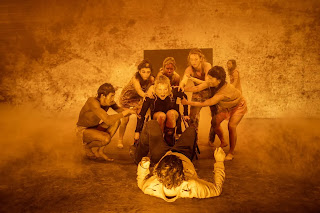In fact van Hove and Koen Tachelet's adaptation goes a bit further back still, to Atreus (Maarten Heijmans) cooking his nephews and serving them to his brother, putting a curse on his own family line.
The inspiration is mostly Euripides' versions of the legend, except for Aeschylus' Agamemnon filling in that part of the story. So we next go to Aulis, where the Greek invasion of Troy has stalled; the ships will only sail if general Agamemnon (Hans Kesting) sacrifices his favourite daughter, and he misleads everyone from his wife Clytemnestra (Chris Nietvelt) to the hero Achilles (Achraf Koutet) to get it done. The next part of the House of Atreus story takes place a decade later, but first this version takes us to the fall of Troy: Mixing together Hecuba and Women of Troy, we get to meet Cassandra (Maria Kraakman,) the only Trojan who seems happy to be sent off into slavery - because her prophetic powers mean she knows how badly it'll end for her captor.
Then we get Agamemnon, in which Clytemnestra takes revenge on Agamemnon for her daughter's murder; before the cycle of revenge ends after the interval: In Elektra, Clytemnestra's eponymous daughter (Hélène Devos) organises her mother's murder; actually doing the deed is her brother Orestes (Minne Koole,) who's just returned from exile in... given the curly mullet and reedy mustache I'm going to say 1980s Alabama, or present-day Australia. Finally in Orestes he tries to get himself and his sister off the death penalty they've been handed for matricide. Euripides' version of the ending is the only one of these plays I haven't encountered in some form or other before, so I must say Helen of Troy's (Nietvelt) death by sword-in-the-vadge was new to me (she gets better.)
Jan Versweyveld's set is surrounded by a scaffolding structure that, as well as dropping various pots of blood and symbolic dust on the characters, houses the musicians of BL!NDMAN [drums] who bring to life Eric Sleichim's aggressive sound design. These angry, somewhat panicked musical interludes are, along with the mud that gets flung around in the second act, the headline stylistic features of the production, but Age of Rage isn't as much a piece of gig theatre as it initially appears: When we get to the actual telling of the story it's surprisingly traditional, with most of the scenes featuring a pair of characters and a chorus recounting the events, and only a couple of the violent acts moved onstage.
In fact one thing this shares with the disastrous The Human Voice is van Hove cleaving to the original text in sometimes nonsensical ways: Specifically here, the ending of Iphigenia in Aulis that sees Iphigenia saved by Artemis at the last moment, spirited away and replaced with a sacrificial deer. It's bizarre to have Iphigenia survive and be witnessed by everyone, including Clytemnestra, who will spend the rest of the evening saying her daughter's dead and taking bloody revenge on her husband for killing her. The show comes with projections showing you the family trees, plus a free digital programme giving an extensive synopsis of every play, and that's probably a bit too needed as this isn't a show for anyone completely unfamiliar with the story going in (I'm not being patronising, I'm going from the fact that everyone I overheard talking in the interval was confused about what was happening and to whom.) It doesn't help that An D’Huys' costumes rarely change when the actors double as different characters; after playing Iphigenia, Ilke Paddenburg doubles as all the sacrificed children, all of whom are dead through Agamemnon's actions, so I'm not sure what it's meant to be saying when she returns, still bloodstained, as part of the Chorus decrying his murder and demanding revenge for it.
I guess you could say this is why Icke's tight psychological study didn't suit how the company wanted to approach the Oresteia: This is a production more about the chaos and grief of war than about the reasons people do what they do, which is why we get that diversion to Troy and Janni Goslinga's Hecuba losing the last few children she thought she'd managed to keep alive. And there are some common threads - particularly these godlike kings and princes being at the mercy of their own subjects, who demand horrific action then want retaliation when it's carried out. But although Age of Rage is always darkly and powerfully entertaining (and, despite the loud music and flashing lights, not as headache-inducing as I'd feared,) it did still feel to me like some opportunities were missed. In the middle of all the sound and fury there's actually a comparatively formal, traditional approach to the plays themselves, which means not all the (many) contradictions come across as part of the overall chaotic theme. I guess what I was looking for was for van Hove to tear up the rulebook on the text as much as he does on the presentation.
Age of Rage by Koen Tachelet and Ivo van Hove, based on Iphigenia in Aulis, Trojan Women, Hecuba, Elektra & Orestes by Euripides, and Agamemnon by Aeschylus, from a translation by Gerard Koolschijn, ends today at the Barbican Theatre.
Running time: 3 hours 45 minutes including interval.
Photo credit: Jan Versweyveld.






No comments:
Post a Comment